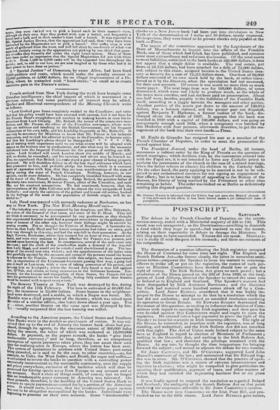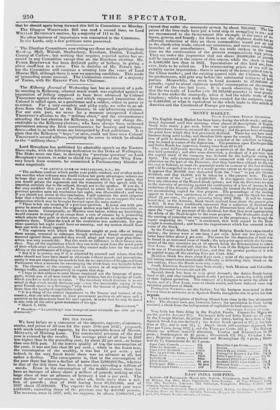The discussion of a question 'affecting the Irish registries occupied
the House of Commons for some time last night. The English and Scotch Reform Act—the former clearly, the latter in somewhat ambi. girous terms—empower the Speaker to issue his warrant to returning.. officers to strike off, or put on the registries, the names of such per. SOBS as Election Committees have decided should lose or gain the right of voting. The Irish Reform Act gives no such power ; but a resolution of the House passed on the 23d of June 1833, at the insti- gation of Lord Althorp, directed the Speaker to extend the same rule to Ireland us to England and Scotland. The Speaker's warrant halt been disregarded by Irish Assistant Barristers; and the Barrister for Cork had restored seven hundred names struck off by a Com- wittee. Lord JOHN RUSSELL considered that it was highly im- proper in the House to attempt to do that by a resolution which the law did not authorize ; and moved an amended resolution, confining its operation to Great Britain. Sir EDWARD SUDDEN deprecated the discussion of this question, as tending to influence the decision of Corn. mittees with regard to opening the Irish registries; and then gave his own derided opinion that Committees might and ought to open the registries.. He entered into a legal argument to prove the right of the Speaker to issue his warrants to Irish returning-officers. The right of the House, Inc contended, to interfere with the registries, was of long standing, and undoubted ; and the Irish Reform Act did not interfere with that right. The Act of Union made Ireland subject to the same laws as England in regard to election of Members of Parliament ; nothing in the Grenville Act, and nothing in the Irish Reform Act, qualified that law ; and therefore the privilege remained with the House. At any rate, he thought the time inopportune for bringing forward the subject ; and moved to adjourn the debate for two months.
Sir JOHN CAMPBELL and Mr. O'CONNELL supported Lord John Russell's statement of the law ; and maintained that Sir Edward Sug.. den was in error. Mr. O'CONNELL showed that the practice of open- e- ine the Irish registries was a source of extreme inconvenience and injustice to electors ; who might be compelled to give particulars re. specting their qualification, payment of taxes, and other matters of which they had satisfied the registering barrister five or *ix years before.
It was finally agreed to suspend the resolution as regarded Ireland and Scotland ; the ambiguity of the Scotch Reform Act on that point rendering the suspension advisable in Sir Jotter CAMPBELL'S opinion.
The House went into Committee on the Irish Poor Bill, and pro- ceeded as far as the 63th clause. Lord Jonas Russerr. gave notice,
that he should again bring forward this bill in Committee on Monday. The Glasgow Waterworks Bill was read a second time, on Lord WILLIAM BENTINCK'S motion, by a majority of 111 to 34.
No other business of importance was transacted in the Commons. In the Lords, only a few petitions were presented.



























 Previous page
Previous page